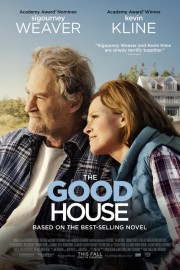The Good House
The moments between Sigourney Weaver and Kevin Kline in “The Good House” are, handily, my favorite parts of the film. “Dave” is a great example of their chemistry together, with “The Ice Storm” adding a different layer to that. Here, they play former lovers who have a mutual respect for one another, but you can always sense that there’s something we just don’t know beneath the surface that is holding them apart. They banter, and end up in bed, but it feels like a “we just feel like it” connection than something more, although it has a hint of that by the end. That is a more interesting dynamic for a romantic relationship than one that is definitely heading in one direction, at least, in a movie like this it is.
“The Good House” is based on a book, which makes a lot of sense when it comes to the way this story unfolds. While Weaver’s Hildy Good is the main character, we get to know a lot of different people in this town, whether it’s her daughters (Rebecca Henderson and Molly Brown), her gay ex-husband (David Rasche), a newcomer to town (Morena Baccarin) or the therapist (Rob Delaney) in town who might be having an affair with a patient. Hildy’s story doesn’t just involve her back-and-forth with Kline’s Frank, a contractor in town- she is a realtor who’s been struggling with alcoholism for as long as her family can remember, and she has a unique ancestry with one of the “witches” during the Salem Witch trials. That one doesn’t really come into play, except during one dinner with people where she shows off her “talents.”
One of the reasons the Weaver and Kline moments work best in this film is because of how nimbly they find that sweet, funny and touching tone of a romantic comedy about two people who are almost embarrassed to be in their situation, until they finally just accept it. The remainder of “The Good House” waffles being alcoholic and psychological melodrama, and soap opera; it doesn’t completely go off the rails, but co-writers/directors Maya Forbes & Wallace Wolodarsky (in adapting the 2013 novel by Ann Leary with Thomas Bezucha) can’t seem to settle on a firm narrative foundation. If it’s about how Weaver, despite having gone to rehab after a rehabilitation, is off the wagon again, it doesn’t completely commit to that. If it wants to lean into Weaver and Kline’s relationship- like the poster makes it look like- it should do that and forget the rest. Of course, there’s no reason the film can’t have both elements, as well as the rest of what the film throws at us, but the script hasn’t delineated these threads enough to make a strong throughline to where it wants to go. It’s a shame, because I think Weaver and Kline have wonderful moments, I think Baccarin and Delaney add something to the film, and even the tension with Hildy’s daughters is well-developed. For some reason, “The Good House” shows cracks in its foundation, to the point where its eventual ending point doesn’t really land the way it wants.










